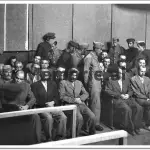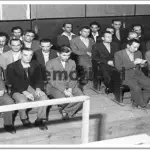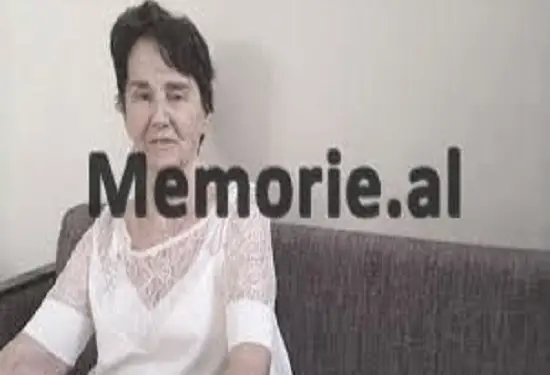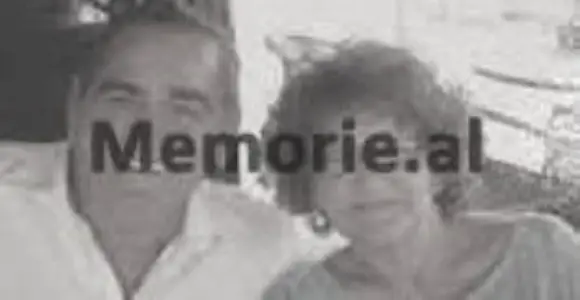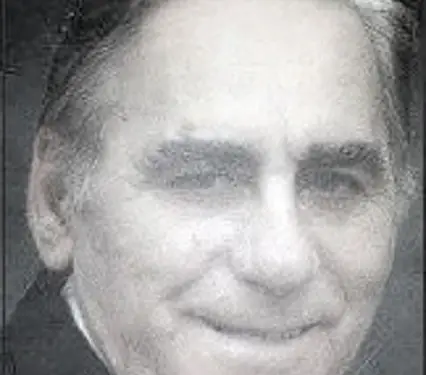Memorie.al/ The tragic story of the family of Ramazan Tabaku, the great Tirana businessman who financed the partisan war in Peza and after the clash with Enver Hoxha, as a deputy and chairman of the Collection Committee, was sentenced to 25 years in prison with the Parliamentary Group. How all members of his family were mercilessly beaten, the escape of two boys from Albania, the tragic death of his mother in exile in the village of Baldushk where there was no one to bury him and the endless vicissitudes of the family that suffered 109 years in prison and exile …
81-year-old Hysen Tabaku, or Ceni, as he is known differently by his family and all his friends, with American citizenship, who fled Albania in 1975, tells for the first time for “Memory” the story of him and his family since father and mother imprisoned, tortured until they showed their gold, family internment and suffering in the village of Baldushk in Tirana, the death of their parents and their tragic burial in the backyard, the escape of their sister to Yugoslavia in 1956, Cen’s own escape in 1975, having made his first prison. The consequences that fell on his wife and the two sons he left in Tirana, the escape of his brother, Engjell, a year later, the escape of his other brother, Ylli from the Fushë-Krujë prison and his 28 years in prison until the life of Ceni in USA, where he helped to stabilize his former close friend, Xhevdet Mustafa. How did he meet the young Albanian girl, Gerta Qosja, with a family who escaped from Lake Shkodra when she was not more than 3 years old? You will follow these and other tragic and creepy stories below in this long interview, which Cen Tabaku gives exclusively to the readers of Memorie.al.
Mr. Hysen, what is the origin and past of your family and why was your father, Ramazan Tabaku, who after 1944 took an important position in the government of Enver Hoxha, as Minister of Collectibles, hit by the communist regime?
The early origin of our family is from Tirana, but we lived for a long time in Durrës, as we were a family of merchants. In 1939, when the Italian occupation of Albania took place, my father, Ramazan, supported the forces that were not yet communist, but were the anti-fascist liberation forces against the occupier. My father was one of the founders of Peza’s gang and he had close friends with its leaders, as Myslym Peza had shaved my brother’s hair, we had a godfather. Kajo Karafili, (assassin and People’s Hero) while he was with Peza’s Çeta, took refuge in our house for some time, because he was wounded in the hands. The father at that time raised Peza from economic and financial power, because he was an idealist and patriot, who loved Albania very much. In those years, my father had a close friendship with Shefqet Beja, a great patriot, a staunch anti-fascist, who, like our father, made a great contribution to the financing of Peza’s gang and the entire anti-fascist movement in that province. But let me dwell on my father, Ramadan, who had a lot of wealth and at the same time did a lot of propaganda to strengthen the partisan forces. When my father was in the mountains, he was at the same time with Rrahman Perllaku, Spiro Moisiu and Omer Nishani. When the liberation came, the father had power and a lot of credibility in leading the country of that time, until 1946. In 1946, the agrarian reform took place and the father was more than a little disappointed before it, we took our property, or rather, they nationalized us. We have a lot of wealth in the district of Durrës, such as on the beach, in a village called Shkallnur, etc. and reform took us all. On January 11, 1946, one evening at the Dajti Hotel, the father had an argument with Enver Hoxha. Among other things, during that conversation, Enver says: “Ramadan, now we will have a lot of work, because we formed the People’s Republic of Albania…”. While the father answers “Enver, keep that job to yourself…, because I do not have to work anymore.”. Enver says: “You have to do something, because you are a martyr brother…”! (In fact, in our father’s family we have a martyr, Abdulla Tabaku, but he is not our father’s brother. For the fact that the father raised him, everyone knew he had him as a brother, but in fact he had Abdullai had a tragic fate, after being captured by the Germans while carrying ammunition to Peza’s gang, he was interned in Mat’hausen, where he died from torture.
Let’s stop at your father’s conversation with Enver Hoxha, what happened next?
After the conversation with Enver, the father complains to Myslym Peza, telling him that his land and property have been nationalized, but Myslym does not give him any hope that he could help him.
So, in a way, your father did not agree with the policies of the communist regime that came to power at that time, or as it was said differently, with the People’s Power…?
Not only did he disagree, but worse, he was very disappointed. My father hated me (as he told me when I spoke to him years later) because he did not like the Yugoslavs and the adaptation of our economic policies to their own system. The father was well acquainted with the Western capitalist system, having traded with Italy. But among the people of the leadership, at that time a fire of love was kindled, which the father could not conceive and could not support. I was small at the time, but I remember crowds of people shouting in the Serbo-Croatian language in the city streets with the slogan “Brotherhood, unity”. The father, in addition to being an MP, had been appointed to a position as Minister of Collection, but without a portfolio. In 1947, the father was arrested with the so-called Group of Deputies, led by Shefqet Beja. After a long period of extremely difficult investigation, he went to court with the Group of Deputies and was initially sentenced to be shot, but then his life was spared as he was a martyr brother and he was sentenced to 25 years in prison. (The photo of our father, Ramazan Tabakut in court, is also in the National Museum in Tirana, at the “Communist Genocide Pavilion”).
Did the debate he had with Enver have an impact on your father’s arrest and subsequent sentencing?
Definitely, because a deputy and a member of the government cabinet headed by Enver Hoxha could not be arrested without his approval and approval.
How many years in prison did the father do?
The father spent 15 years and 7 months and was released in 1962, when Enver Hoxha’s communist regime had just broken with the Soviet Union and official Tirana was in a state of political depression, as it did not know where to turn. And in this situation some apologies were made and many political prisoners were released, where one of them was our father. While serving my sentence, I had the opportunity to be in prison for many years, in a work camp with my father, Ramadan, in the Rinas aviation field, which was built almost entirely with the sweat, contribution and blood of political prisoners. But I am going back once again to 1947 when my father was convicted, as Enver Hoxha’s anger did not end with the arrest of Ramadan. While the father was arrested and, in the investigator, we were also arrested by our mother, Sabrije, who was kept for nine months in the investigator, torturing him to show where our family’s gold was. After nine months of torture, the mother could no longer resist and showed her the place where the family gold was hidden, and after they came and took us, only then did they release our mother from prison. I wanted to add that when they arrested the mother, they also arrested all of their children; four sisters and three brothers (Vera, Nevrezi, Dhurata, Drita, Hyseni, Engjëlli, Ylli) and have kept us isolated for a long time in the interrogator and prison. Sister, Nevrezi has done four years in prison and Dhurata two. The rest of us brothers were later sentenced to prison and internment, and if you add them all up, we as a family have spent a total of 109 years in prison and internment.
After being released from prison, how did the life of your father, Ramadan, go?
My father was released in 1962 after spending 15 years and 7 months in prison and spent several years in the basement where we slept. Years later, after I had fled Albania, my other brother, Engjëlli, my mother, sisters and father were removed from Tirana and deported to the village of Baldushk. There his father died in 1982, after being ill from the long years of prison. Death is death, and when it comes from God you have nothing to do with it, but the burial of our father was another very tragic thing and a very painful moment for anyone who can hear it, not for our family. Without exaggeration I can tell you that his burial was probably even worse than death itself.
In what sense…?!
But when my father died there in exile in the village of Baldushk, only my mother, Sabrija, and my two sisters, Nevrezi and Dhurata, were at home, because we brothers had escaped (me and Engjëlli) and the other brother, Ylli, was in prison. The mother was seriously ill and unable to move, while the two sisters, who were in poor health, had no power to bury their father. After digging a hole, they asked not to find any planks, but they had nothing. Then, with great difficulty, they dragged their father by the legs, until they led him to the pit in the corner of the yard that would be his grave.
Did they ask for help?
As the sisters told me years later, they turned to a villager who happened to be passing by for help, as it was not a question of them going to anyone’s house, even if this is the case we are talking about, as they did not want to harmed man. But that peasant did not come either, because we were a declassed family and he did not know it, he meant it, because it was not normal for a dead person to be taken to the grave only by his two daughters, much less in the corner of backyard. But you have to understand and put the event in the context of what happened at the time, and that at the time was, so to speak, acceptable to the one who suffered. The communist regime had forced the Albanian-Albanian and the brother-brother to look down on him. If you had a bad biography, people would leave as if you had the plague. So, it was with our family.
What about when your mother died?
I wanted to tell you this, that even when his mother, Sabrija, died, he was buried with the same ritual. The two sisters and granddaughter pulled him by the legs and buried him near his father.
What if your relatives did not report the death of your father or the death of your mother?
Yes, they were informed and the news went to Tirana that he died, but no one from the tribe went to bury him, except for the family of his sister, Vera. So, we were left alone. We as a family had reached that critical point that we were under constant pressure from the dictatorship of the proletariat, or rather the State Security that followed us and monitored us everywhere. But there is a law that is studied in the subject of Physics, which also applies to humans. Which means ‘when something is pressed, it always tends to rise’. This is what happened to some of those Albanian families who were oppressed by the communist regime, who in some way either reacted silently, or thought and tried to leave Albania. Some, though not many, managed to escape from Albania, and some ended up again behind bars. I had a tendency to get up and after I got out of the prison wires, then I got out of that big wireless prison that was called Albania./Memorie.al
Following is Part II




